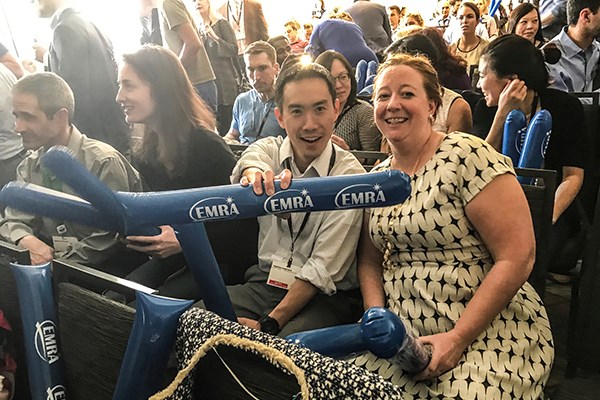This year marked the first time EMRA brought its resident programming to the CORD Academic Assembly. We started strong and can't wait to go back!
2018 marked the first time EMRA brought all its resident programming to the CORD Academic Assembly. The EMRA Quiz Show, Representative Council, Chaos in the ED, and Leadership Academy were a few of the big events that took place in San Antonio. In addition, the 2018-2019 EMRA Medical Student Council (MSC) held its first in- person meeting alongside all of EMRA’s other committees, including the newly developed Administration & Operations Committee.
As a medical student on the MSC, it's a privilege to attend and collaborate with committee leaders, network with current residents and faculty, and learn about everything EMRA is doing on behalf of residents and medical students across the nation. Here are a few key observations from my time at the conference:
- EMRA is a vital organization to maintaining the strength, autonomy, and overall health of emergency medicine as a field and career. As a separate entity working alongside ACEP, EMRA is the voice of the up-and-coming generation of physicians, allowing our thoughts and opinions to be heard on all topics. Some important topics discussed at length at the conference included maintenance of certification concerns, interactions with other medical specialties on functions and procedures vital to our EM practice, and political topics, such as our stance as an organization on gun control reform. The information discussed demonstrates the future-focused nature of EMRA’s resident and medical student members as well as the awareness of our members to the constantly changing socioeconomic and societal concerns that may affect our practice.
- EMRA is a breeding ground for the future leaders of our field, as can be demonstrated by the 19 committees, including Education, Critical Care, and Diversity and Inclusion committees. The spread of leaders broadened this year, as each committee sought to expand leadership positions to include a vice chair, sometimes two, and dedicated medical student liaison positions. Some important contributions born out of EMRA’s committees include various pocket-sized guide books and reference cards for use on-shift. The development of future leaders is highlighted by the collaboration between faculty at every level, current residents, and medical students working together to make EMRA an outstanding organization.
- The friendships formed and acquaintances met through attending EMRA events at various conferences are some of the best you can experience and develop over the course of your career. You will meet people that you will see at conferences for the next few decades, in addition to seeing each other along the interview trail and possibly as future co-residents and colleagues. Friendships born through EMRA are built to last a lifetime through a mutual interest in being the best emergency physicians each of us can be and helping guide other along the same path.
In summary, EMRA strives each year to provide unique programming for residents and medical students in addition to creating an amazing atmosphere for anyone at any training level to participate. Chaos in the ED was a fun-filled event that saw residents from multiple programs combining together as teams, not to mention ACEP Board member Vidor Friedman, MD, FACEP, getting in on the action as well. Behind the scenes, there are countless wonderful people working on myriad details for a great experience, and every event further demonstrates how awesome EMRA is and the bright future it has as an organization. I hope you get a chance to attend whether it be as a student, resident, or attending physician because everyone is welcome and there is a place for everyone to get involved!



